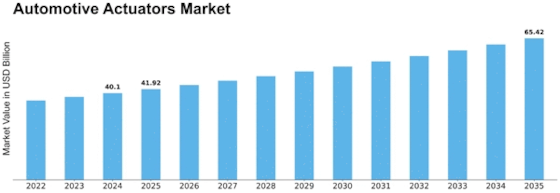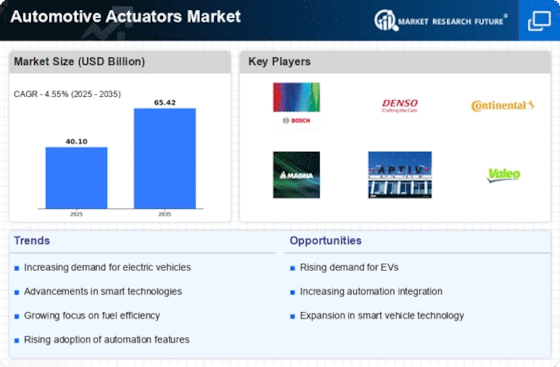Automotive Actuators Size
Automotive Actuators Market Growth Projections and Opportunities
The Automotive Actuators Market operates within the intricate web of dynamic forces that shape the automotive industry. Actuators, critical components responsible for controlling various mechanisms in vehicles, have witnessed a surge in demand due to advancements in automotive technology and the ever-increasing focus on enhancing vehicle performance, efficiency, and safety.
One key driver of market dynamics in the Automotive Actuators sector is the constant evolution of vehicle designs and functionalities. As automotive manufacturers strive to meet consumer demands for more efficient and sophisticated vehicles, the need for advanced actuators becomes paramount. Actuators play a pivotal role in enabling precise control of essential functions such as engine management, fuel injection, and braking systems. Consequently, market players are engaged in a continuous race to develop innovative actuators that align with the evolving landscape of automotive technology.
Another significant factor influencing market dynamics is the increasing emphasis on environmental sustainability and fuel efficiency. The global automotive industry is undergoing a transformative shift towards electric and hybrid vehicles to reduce carbon emissions and minimize environmental impact. This transition requires actuators with enhanced capabilities to manage electric powertrains, regenerative braking systems, and other components unique to electric vehicles. The Automotive Actuators Market is, therefore, witnessing a shift towards the development of actuators tailored to meet the specific demands of electric and hybrid vehicles.
Furthermore, the intensifying focus on vehicle safety has emerged as a crucial determinant of market dynamics. Actuators contribute significantly to the implementation of advanced safety features, such as anti-lock braking systems (ABS), electronic stability control (ESC), and advanced driver assistance systems (ADAS). With the growing awareness of safety concerns among consumers and stringent regulatory requirements, automotive manufacturers are investing in the integration of advanced actuators to enhance overall vehicle safety performance.
Market dynamics are also shaped by the competitive landscape within the automotive industry. The Automotive Actuators Market is highly competitive, with numerous players vying for market share. This competition is driving continuous innovation and the development of cost-effective solutions. Market participants are engaged in strategic collaborations, mergers, and acquisitions to strengthen their product portfolios and expand their global footprint. The pursuit of economies of scale and a diverse product range is influencing the overall pricing and availability of actuators in the market.
Moreover, geopolitical factors and macroeconomic conditions contribute to the ebb and flow of the Automotive Actuators Market. Fluctuations in raw material prices, trade policies, and geopolitical tensions can impact the manufacturing costs and supply chain dynamics, thereby influencing the pricing and availability of actuators. The industry must navigate these external factors and adapt to the evolving geopolitical landscape to maintain stability and sustained growth.
In conclusion, the Automotive Actuators Market operates within a dynamic ecosystem shaped by technological advancements, environmental considerations, safety imperatives, competitive forces, and external geopolitical factors. As the automotive industry continues to evolve, so too will the market dynamics of automotive actuators, reflecting the ongoing quest for innovation, efficiency, and safety in vehicles worldwide.



















Leave a Comment